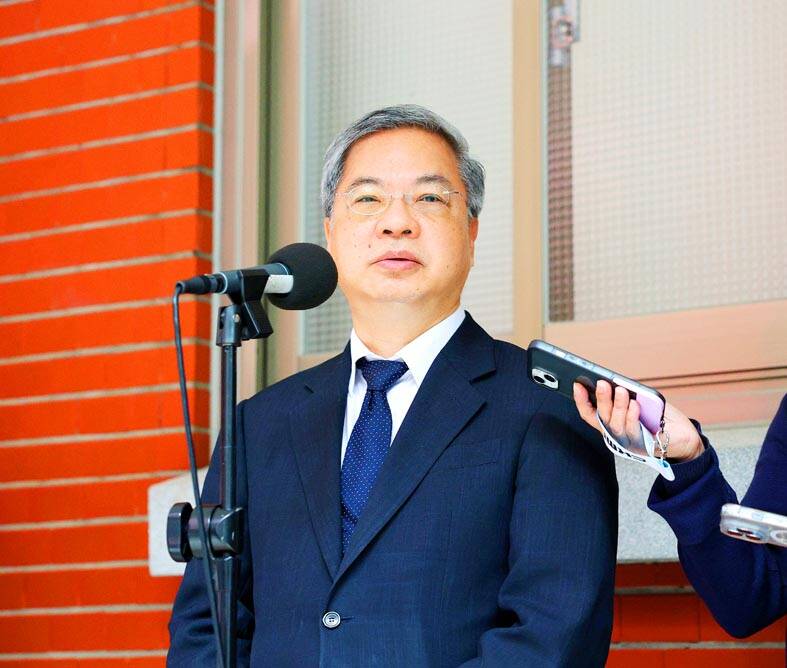The government will cooperate with the High Prosecutors’ Office investigation into alleged intellectual property theft from Taiwan Semiconductor Manufacturing Co (TSMC, 台積電), Minister of Economic Affairs Kung Ming-hsin (龔明鑫) said yesterday.
The alleged theft raises national security concerns, and could affect the industry as a whole, leading to losses for local companies, Kung said on the sidelines of a legislative meeting in Taipei.
The ministry would cooperate with prosecutors and explain its control mechanisms for core key technologies to determine whether the incident contravenes the National Security Act (國家安全法), he said.

Photo: CNA
The minister’s remarks followed a report by the Chinese-language Liberty Times (the sister paper of the Taipei Times) that prosecutors were investigating former TSMC senior vice president Lo Wei-jen (羅唯仁), who retired in July after 21 years at the company, for allegedly stealing the foundry’s most advanced process technologies, including 2-nanometer, 16A and 14A technologies, before reportedly joining Intel Corp last month.
Lo allegedly asked his subordinates before retiring to brief him about the advanced technologies and took the confidential documents with him, the Liberty Times reported.
He took more than 80 boxes of data and books when he departed, raising suspicions at TSMC, the daily said.
Before joining TSMC in 2004, Lo worked at Intel in technology development and management.
TSMC is reportedly collecting evidence in preparation for legal action against Lo.
Prosecutors on Tuesday opened an intellectual property theft investigation into whether Lo contravened the National Security Act and the Trade Secrets Act (營業秘密法), the report said.
Kung said the ministry would provide TSMC assistance should the company file a trade secret lawsuit against Lo, and would monitor the situation closely to determine whether the incident would harm the nation’s semiconductor ecosystem or affect relations with customers.
Asked about government safeguards to prevent leaks of core technologies, Kung said the ministry has established protection mechanisms and would continue to update the scope of core technologies covered.
The ministry is still investigating whether Lo signed a noncompetition agreement with TSMC, which could prevent him from joining a competing company, Kung said.
Once the situation becomes clear, the ministry would discuss with the Industrial Technology Research Institute about whether to suspend or revoke Lo’s laureate title, which was granted to him in September, he said.
The legislature amended the National Security Act in 2022, tightening regulations on industrial espionage and the leaking of operational secrets, while establishing a list of 32 items classified as national core key technologies.
It is up to TSMC to identify which technologies might have been taken, and the ministry would work with prosecutors to explain whether those technologies correspond to any items on the list, Kung said.

MISINFORMATION: The generated content tends to adopt China’s official stance, such as ‘Taiwan is currently governed by the Chinese central government,’ the NSB said Five China-developed artificial intelligence (AI) language models exhibit cybersecurity risks and content biases, an inspection conducted by the National Security Bureau (NSB) showed. The five AI tools are: DeepSeek, Doubao (豆包), Yiyan (文心一言), Tongyi (通義千問) and Yuanbao (騰訊元寶), the bureau said, advising people to remain vigilant to protect personal data privacy and corporate business secrets. The NSB said it, in accordance with the National Intelligence Services Act (國家情報工作法), has reviewed international cybersecurity reports and intelligence, and coordinated with the Ministry of Justice Investigation Bureau and the National Police Agency’s Criminal Investigation Bureau to conduct an inspection of China-made AI language

BOOST IN CONFIDENCE: The sale sends a clear message of support for Taiwan and dispels rumors that US President Donald Trump ‘sold out’ the nation, an expert said The US government on Thursday announced a possible sale to Taiwan of fighter jet parts, which was estimated to cost about US$330 million, in a move that an expert said “sends a clear message of support for Taiwan” amid fears that Washington might be wavering in its attitude toward Taipei. It was the first announcement of an arms sale to Taiwan since US President Donald Trump returned to the White House earlier this year. The proposed package includes non-standard components, spare and repair parts, consumables and accessories, as well repair and return support for the F-16, C-130 and Indigenous Defense Fighter aircraft,

CHECKING BOUNDARIES: China wants to disrupt solidarity among democracies and test their red lines, but it is instead pushing nations to become more united, an expert said The US Department of State on Friday expressed deep concern over a Chinese public security agency’s investigation into Legislator Puma Shen (沈伯洋) for “secession.” “China’s actions threaten free speech and erode norms that have underpinned the cross-strait ‘status quo’ for decades,” a US Department of State spokesperson said. The Chongqing Municipal Public Security Bureau late last month listed Shen as “wanted” and launched an investigation into alleged “secession-related” criminal activities, including his founding of the Kuma Academy, a civil defense organization that prepares people for an invasion by China. The spokesperson said that the US was “deeply concerned” about the bureau investigating Shen

‘TROUBLEMAKER’: Most countries believe that it is China — rather than Taiwan — that is undermining regional peace and stability with its coercive tactics, the president said China should restrain itself and refrain from being a troublemaker that sabotages peace and stability in the Indo-Pacific region, President William Lai (賴清德) said yesterday. Lai made the remarks after China Coast Guard vessels sailed into disputed waters off the Senkaku Islands — known as the Diaoyutai Islands (釣魚台) in Taiwan — following a remark Japanese Prime Minister Sanae Takaichi made regarding Taiwan. Takaichi during a parliamentary session on Nov. 7 said that a “Taiwan contingency” involving a Chinese naval blockade could qualify as a “survival-threatening situation” for Japan, and trigger Tokyo’s deployment of its military for defense. Asked about the escalating tensions